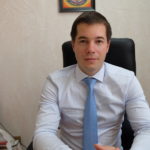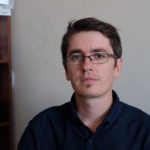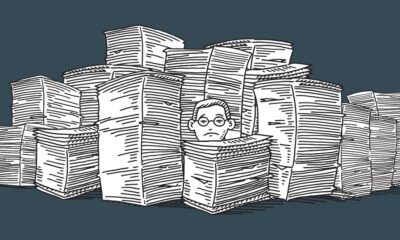Diaspora
Mass Exodus from Moldova, the Fastest Shrinking Country in the World
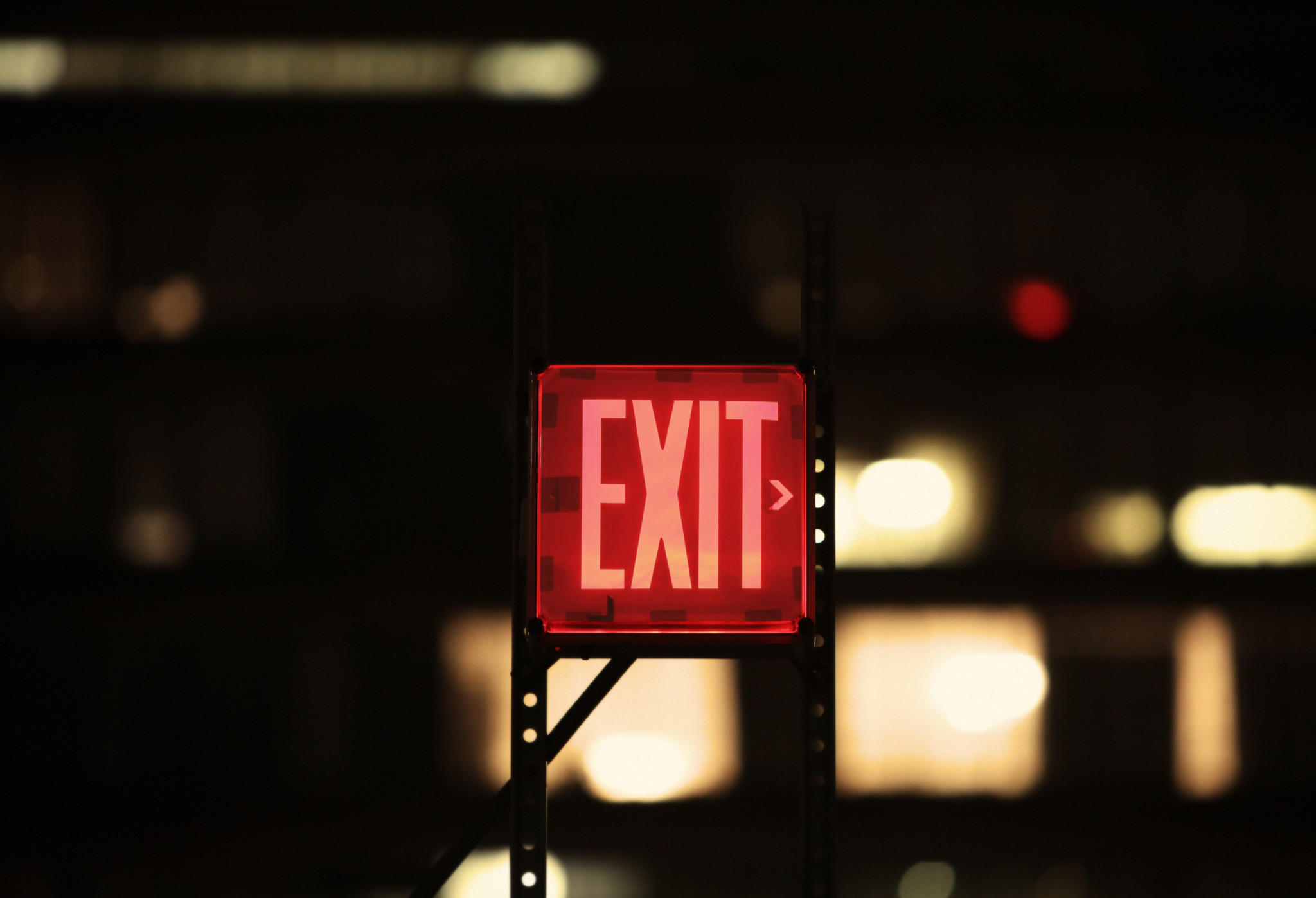
CHISINAU, Moldova — On a rainy October day, two years ago, Oleg Bumbac, 29, landed at Luton Airport, in southern England. While walking on the airstairs, dressed in a blue business suit, Bumbac realized that he left Moldova for good.
“I felt a bittersweet feeling of guilt and excitement. I did it, I said to myself,” remembered Bumbac. After six years of medical school and four years of working as an emergency doctor in Moldova, he realized that he couldn’t live anymore with a salary of 134 Euro a month. He needed to leave.
Bumbac is not the only Moldovan fed up with the country enough to move away. More than 15 percent of Moldova’s population, some 550 thousand citizens, currently live outside Moldova, according to Civis Centre of sociological, political and psychological investigations. The total number of migrants translates into a third of the employable population while every fifth of them is actually a highly qualified worker (teacher, doctor, economist or engineer). According to BBC, four people exit the country for a better life every hour, making Moldova the fastest shrinking country in the world.
Moldova is now at a crossroads. After almost twenty years, the country faces the first direct presidential elections. On Nov. 14, the day after the second round, pro-Russia candidate Igor Dodon or pro-Europe rival Maia Sandu will officially become the head of state. If pro-Russia candidate Igor Dodon wins presidency, Moldova could forge closer ties with Russia again. Meanwhile, Bumbac will vote for a European future in the heart of England. “In the first round, there weren’t enough ballots. I am afraid that not everyone will be able to vote on Nov. 13, but I am so moved. Moldovans across the world are gathering together to choose their president,” said Bumbac .
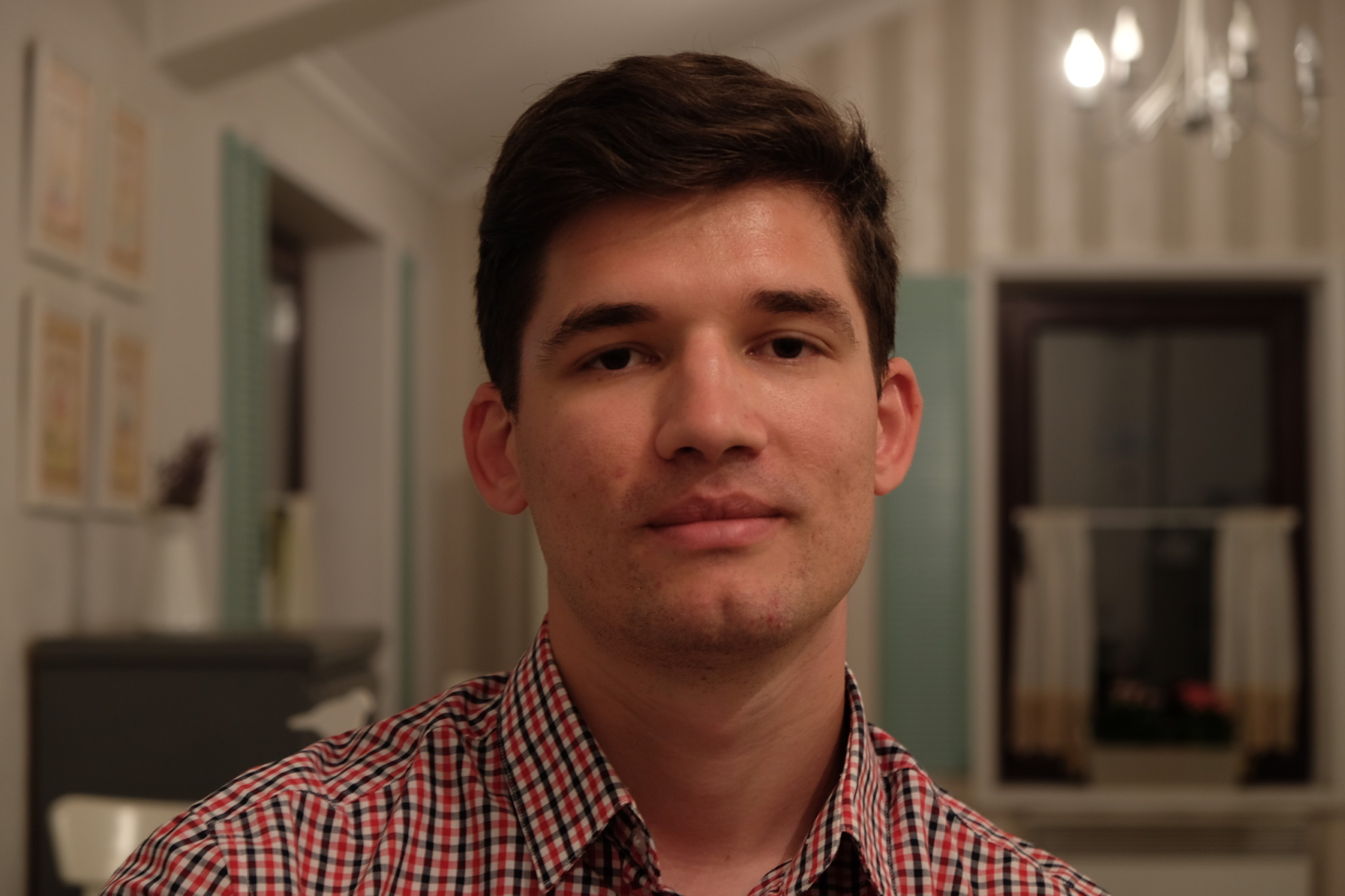
Oleg Bumbac (29, doctor) is one of 550 thousand citizens of Moldova who left the country. Photo: Victoria Colesnic
From Moldova to England
Oleg Bumbac was born in a small village, surrounded by vineyards and fruit gardens, called Hajdieni in northern Moldova. He graduated the lyceum in Glodeni city, where he edited a local newspaper with a close friend. As a child, Bumbac loved to study and was the teachers’ first candidate for different academic competitions. After graduating school, the boy decided to become a doctor, so he moved to Chisinau, the capital of Moldova. “The admission contest was fierce. More than fifteen candidates competed for each place,” Bumbac said. Yet, he managed to get a state-funded scholarship at the Faculty of General Medicine.
After six years of challenging studies, Bumbac got his first job as an emergency assistant in the Municipal Emergency Hospital. “I didn’t expect it to be easy, but it felt impossible. I don’t remember days when the emergency kit had everything it was supposed to. I had the most important medicine, but the kit was never full.” Meanwhile, in 2013, Bumbac’s salary was about 100 Euro for ten 24-hour shifts per month while the living wage (the minimum income necessary to meet basic needs) was 98 EUR. In order to survive, Bumbac used to take more shifts. “Of course, I chose the cheapest rent. But to be able to pay even that, I had to take 15-18 shifts every month. Sometimes, I had to stay for 48 hours straight, because there were not enough doctors, which also happened frequently,” Bumbac stated.
Even employed as an emergency room doctor, Bumbac didn’t receive more than 130 EUR. According to him, every emergency medical team should have at least one doctor and two to three assistants, but these teams were never complete. “So I had to respond to the patient’s request completely alone. A lot of pressure was put on the doctors. And, of course, in these stressful conditions, I was not allowed to make any mistakes,” said Bumbac.
The idea of leaving Moldova was always in the back of his head. “A lot of my colleagues had left and I was so tired to live slightly above minimum wage. I wasn’t able to buy clothes, books or to travel anywhere,” said Bumbac. He managed to survive because of his mother who also left the country and started working in Greece in order to help the family. For more than 15 years, she cooked pastries and taught Russian language. “She was my help, I wouldn’t have made it without her,” said Bumbac.
During the following six months, Bumbac passed through a lot of interviews, collected recommendation letters and prepared for the big journey. When he was told that he had gotten a job at a private hospital in England, he needed a few minutes to realize his life was about to change drastically. “I had very mixed feelings. I left my job with a feeling of guilt, because I was leaving my colleagues behind, amazing doctors, who are not guilty that the medical system in Moldova is ruined. But I was also so excited! I knew it was going to be huge,” said Bumbac.
Two years ago, on Oct. 16, Bumbac passed for the first time the threshold of the British hospital. “I was excited, but also very stressed. I had to prove that I am a good doctor if I wanted to stay. I even took a small bag because I didn’t know what this unbelievable journey would bring,” said Bumbac.
Now Bumbac lives in London and is the hospital’s doctor on call. Every day, he supervises up to 60 patients or more, responds to all kinds of emergencies and works with his patients’ physicians on their follow-up treatment. He talks warmly with his patients about Moldova. “I even have this prepared presentation. It sounds like this: Moldova is a tiny country between Romania and Ukraine. It has the biggest wine cellars in the world and the tastiest wine in Eastern Europe,” said Bumbac like talking to an invisible camera. At work, on his desk, he keeps a small traditional clay bell. “It has Moldova written on it and it has this small vine leaf as the bell clapper, so that I don’t forget where I should return,” he said.
No wind of change
On 7th of April, thousands of demonstrators claimed that 2009 parliamentary election results were fraudulent and gathered in major cities of Moldova demanding a recount, a new election, or resignation of the communist government. In Chisinau, where the number of protesters rose above 30,000, the demonstration escalated into a riot. On this day, Bumbac protested peacefully in the center of the capital. “I am not a rebel. I couldn’t throw stones, but I was on the side of those who did, because that communist government deserved the stones. Unfortunately, the change that we had brought [the pro-European parties] didn’t fulfill our expectations for a bright European future,” he said. At these presidential elections, Bumbac thinks that Moldova has a chance to start over. “Watching the debates, I realized that Igor Dodon is a rasist, intolerant person. Maia Sandu is the only honest candidate, that has a plan on fighting the corruption’, said Bumbac. “If we don’t win this battle, I sincerely don’t see any perspectives in Moldova for now,” he said.
According to a national survey, conducted by Magenta research company in March 2016, 83 percent of citizens of Moldova think that the country is going in the wrong direction while 60 percent of Moldavans claim that they are worse off than they were last year. On top of it, 74 percent are convinced that the situation will either not change or will become even worse.
Vitalie Varzari, a local consultant at the International Organization for Migration believes that “the lack of trust in the state institutions, the disappointment in the society and the country encouraged migration.” On the other hand, Ruslan Sintov, sociologist and director of Civis Centre of sociological, political and psychological investigations, is convinced that the effects of the disappointment are yet to be seen. “If the economic situation in the country does not get better, people will continue to leave. According to our surveys, another 100 thousand citizens have intentions to leave Moldova in the next 12 months. Moreover, the number of those who took all their family members with them doubled during the last two years,” Sintov affirmed.
- Ruslan Sintov, sociologist and director of Civis Centre of sociological, political and psychological investigations. Photo: Victoria Colesnic
- Vitalie Varzari, local consultant at the International Organization for Migration. Photo: Victoria Colesnic
Experts agree that the most frightening phenomenon is the unwillingness of the citizens to return. “If in 2012, the migrants were saving money to buy a house here, now the number of those willing to invest in real estate in Moldova is decreasing dramatically. If in 2013, 40 percent of migrants were interested to invest in Moldova, then by now, this intention has shrunk by a third,” Sintov continued, explaining that it all comes down to the $1 billion embezzlements. “The decision to leave the country is a difficult one, so we can’t expect a massive and quick response from the population, but we are convinced that even more people will leave Moldova, if nothing changes.”
Bumbac sees his leave as a form of protest against the reality in Moldova. “What else can doctors do? If they quit, they will starve. If they change the job, they will lose their profession. So the only solution is to leave the country. This is the only way to attract the government’s attention. People will suffer, but then again they already do. The protests don’t work. People stayed in the streets for almost a year and nothing changed,” recalled Bumbac the large scale anti-corruption demonstrations in Moldova during 2015.
However, Bumbac is one of the few willing to return someday. “I think I will stay in the U.K. for the next ten years, but then I would like to come back and implement the things I learnt. I still feel indebted to our medical system that formed me as a specialist”. The man recognizes that he has no idea how he will be able to do that. “Probably, I will have to save money so that I don’t need to survive with Moldova’s salary. You know, I realized that managing to live in Moldova is actually a luxury,” added Bumbac and chuckled, looking through the window.
Important
#WorldForUkraine – a map that shows the magnitude of the world’s actions against Russian aggression

The international community and volunteers from all over te world have launched #WorldForUkraine as a platform that shows the magnitude of the world’s actions against the Russian aggression. In a digital world – it is an interactive map of public support of Ukrainians under the hashtag #WorldForUkraine – rallies, flash mobs, protests around the world. In the physical dimension – it is your opportunity to take to the streets and declare: “No to Putin’s aggression, no to war.”
„Today, along with the political and military support, emotional connection with the civilized world and truthful information are extremely important for Ukraine. The power to do it is in your hands. Join the #WorldForUkraine project and contribute to the victorious battle against the bloodshed inflicted on Ukraine by the aggression of the Russian Federation”, says the „about the project” section of the platform.
Go to the streets — Tell people — Connect and Unite — Become POWERFUL
Volunteers have launched #WorldForUkraine as a platform that shows the magnitude of the world’s actions against Russian aggression. In digital world – it is an INTERACTIVE MAP of public support of Ukrainians worldforukraine.net under the hashtag #WorldForUkraine – rallies, flash mobs, protests around the world. In the physical dimension – it is your opportunity to take to the streets and declare: “No to Putin’s aggression, no to war.” There you may find information about past and future rallies in your city in support of Ukraine. This is a permanent platform for Ukrainian diaspora and people all over the world concerned about the situation in Ukraine.
So here’s a couple of things you could do yourself to help:
* if there is a political rally in your city, then participate in it and write about it on social media with geolocation and the hashtag #WorldForUkraine
* if there are no rallies nearby, organize one in support of Ukraine yourself, write about it on social media with geolocation adding the hashtag #WorldForUkraine
The map will add information about gathering by #WorldForUkraine AUTOMATICALLY
Your voice now stronger THAN ever
All rallies are already here: https://worldforukraine.net
Important
How is Moldova managing the big influx of Ukrainian refugees? The authorities’ plan, explained

From 24th to 28th of February, 71 359 Ukrainian citizens entered the territory of Republic of Moldova. 33 173 of them left the country. As of this moment, there are 38 186 Ukrainian citizens in Moldova, who have arrived over the past 100 hours.
The Moldovan people and authorities have organized themselves quickly from the first day of war between Russia and Ukraine. However, in the event of a prolonged armed conflict and a continuous influx of Ukrainian refugees, the efforts and donations need to be efficiently managed. Thus, we inquired about Moldova’s long-term plan and the state’s capacity to receive, host, and treat a bigger number of refugees.
On February 26th, the Ministry of Labor and Social Protection of Moldova approved the Regulation of organization and functioning of the temporary Placement Center for refugees and the staffing and expenditure rules. According to the Regulation, the Centers will have the capacity of temporary hosting and feeding at least 20 persons, for a maximum of 3 months, with the possibility of extending this period. The Centers will also offer legal, social, psychological, and primary medical consultations to the refugees. The Center’s activity will be financed from budget allocations, under Article 19 of Provision no. 1 of the Exceptional Situations Commission from February 24th, 2022, and from other sources of funding that do not contravene applicable law.
The Ministry of Inner Affairs and the Government of Moldova facilitated the organization of the volunteers’ group “Moldova for Peace”. Its purpose is to receive, offer assistance and accommodation to the Ukrainian refugees. The group is still working on creating a structure, registering and contacting volunteers, etc. It does not activate under a legal umbrella.
Lilia Nenescu, one of the “Moldova for Peace” volunteers, said that the group consists of over 20 people. Other 1700 registered to volunteer by filling in this form, which is still available. The group consists of several departments:
The volunteers’ department. Its members act as fixers: they’re responsible for connecting the people in need of assistance with the appropriate department. Some of the volunteers are located in the customs points. “The Ministry of Inner Affairs sends us every day the list of the customs points where our assistance is needed, and we mobilize the volunteers”, says Lilia Nenescu.
The Goods Department manages all the goods donated by the Moldavian citizens. The donations are separated into categories: non-perishable foods and non-food supplies. The volunteers of this department sort the goods into packages to be distributed.
The Government intends to collect all the donations in four locations. The National Agency for Food Safety and the National Agency for Public Health will ensure mechanisms to confirm that all the deposited goods comply with safety and quality regulations.
The Service Department operates in 4 directions and needs the volunteer involvement of specialists in psychology, legal assistance (the majority of the refugees only have Ukrainian ID and birth certificates of their children); medical assistance; translation (a part of the refugees are not Ukrainian citizens).
According to Elena Mudrîi, the spokesperson of the Ministry of Health, so far there is no data about the number of Covid-19 positive refugees. She only mentioned two cases that needed outpatient medical assistance: a pregnant woman and the mother of a 4-day-old child.
The Accommodation Department. The volunteers are waiting for the centralized and updated information from the Ministry of Labor about the institutions offering accommodation, besides the houses offered by individuals.
The Transport Department consists of drivers organized in groups. They receive notifications about the number of people who need transportation from the customs points to the asylum centers for refugees.
The municipal authorities of Chișinău announced that the Ukrainian children refugees from the capital city will be enrolled in educational institutions. The authorities also intend to create Day-Care Centers for children, where they will be engaged in educational activities and will receive psychological assistance. Besides, the refugees from the municipal temporary accommodation centers receive individual and group counseling.
In addition to this effort, a group of volunteers consisting of Ana Gurău, Ana Popapa, and Andrei Lutenco developed, with the help of Cristian Coșneanu, the UArefugees platform, synchronized with the responses from this form. On the first day, 943 people offered their help using the form, and 110 people asked for help. According to Anna Gurău, the volunteers communicate with the Government in order to update the platform with the missing data.
Translation from Romanian by Natalia Graur
Featured
FC Sheriff Tiraspol victory: can national pride go hand in hand with political separatism?

A new football club has earned a leading place in the UEFA Champions League groups and starred in the headlines of worldwide football news yesterday. The Football Club Sheriff Tiraspol claimed a win with the score 2-1 against Real Madrid on the Santiago Bernabeu Stadium in Madrid. That made Sheriff Tiraspol the leader in Group D of the Champions League, including the football club in the groups of the most important European interclub competition for the first time ever.
International media outlets called it a miracle, a shock and a historic event, while strongly emphasizing the origin of the team and the existing political conflict between the two banks of the Dniester. “Football club from a pro-Russian separatist enclave in Moldova pulls off one of the greatest upsets in Champions League history,” claimed the news portals. “Sheriff crushed Real!” they said.
Moldovans made a big fuss out of it on social media, splitting into two groups: those who praised the team and the Republic of Moldova for making history and those who declared that the football club and their merits belong to Transnistria – a problematic breakaway region that claims to be a separate country.
Both groups are right and not right at the same time, as there is a bunch of ethical, political, social and practical matters that need to be considered.
Is it Moldova?
First of all, every Moldovan either from the right or left bank of Dniester (Transnistria) is free to identify himself with this achievement or not to do so, said Vitalie Spranceana, a sociologist, blogger, journalist and urban activist. According to him, boycotting the football club for being a separatist team is wrong.
At the same time, “it’s an illusion to think that territory matters when it comes to football clubs,” Spranceana claimed. “Big teams, the ones included in the Champions League, have long lost their connection both with the countries in which they operate, and with the cities in which they appeared and to which they linked their history. […] In the age of globalized commercial football, teams, including the so-called local ones, are nothing more than global traveling commercial circuses, incidentally linked to cities, but more closely linked to all sorts of dirty, semi-dirty and cleaner cash flows.”
What is more important in this case is the consistency, not so much of citizens, as of politicians from the government who have “no right to celebrate the success of separatism,” as they represent “the national interests, not the personal or collective pleasures of certain segments of the population,” believes the political expert Dionis Cenusa. The victory of FC Sheriff encourages Transnistrian separatism, which receives validation now, he also stated.
“I don’t know how it happens that the “proud Moldovans who chose democracy”, in their enthusiasm for Sheriff Tiraspol’s victory over Real Madrid, forget the need for total and unconditional withdrawal of Russian troops from Transnistria!” declared the journalist Vitalie Ciobanu.
Nowadays, FC Sheriff Tiraspol has no other choice than to represent Moldova internationally. For many years, the team used the Moldovan Football Federation in order to be able to participate in championships, including international ones. That is because the region remains unrecognised by the international community. However, the club’s victory is presented as that of Transnistria within the region, without any reference to the Republic of Moldova, its separatist character being applied in this case especially.
Is it a victory?
In fact, FC Sheriff Tiraspol joining the Champions League is a huge image breakthrough for the Transnistrian region, as the journalist Madalin Necsutu claimed. It is the success of the Tiraspol Club oligarchic patrons. From the practical point of view, FC Sheriff Tiraspol is a sports entity that serves its own interests and the interests of its owners, being dependent on the money invested by Tiraspol (but not only) oligarchs.
Here comes the real dilemma: the Transnistrian team, which is generously funded by money received from corruption schemes and money laundering, is waging an unequal fight with the rest of the Moldovan football clubs, the journalist also declared. The Tiraspol team is about to raise 15.6 million euro for reaching the Champions League groups and the amounts increase depending on their future performance. According to Necsutu, these money will go directly on the account of the club, not to the Moldovan Football Federation, creating an even bigger gab between FC Sheriff and other football clubs from Moldova who have much more modest financial possibilities.
“I do not see anything useful for Moldovan football, not a single Moldovan player is part of FC Sheriff Tiraspol. I do not see anything beneficial for the Moldovan Football Federation or any national team.”
Is it only about football?
FC Sheriff Tiraspol, with a total estimated value of 12.8 million euros, is controlled by Victor Gusan and Ilya Kazmala, being part of Sheriff Holding – a company that controls the trade of wholesale, retail food, fuels and medicine by having monopolies on these markets in Transnistria. The holding carries out car trading activities, but also operates in the field of construction and real estate. Gusan’s people also hold all of the main leadership offices in the breakaway region, from Parliament to the Prime Minister’s seat or the Presidency.
The football club is supported by a holding alleged of smuggling, corruption, money laundering and organised crime. Moldovan media outlets published investigations about the signals regarding the Sheriff’s holding involvement in the vote mobilization and remuneration of citizens on the left bank of the Dniester who participated in the snap parliamentary elections this summer and who were eager to vote for the pro-Russian socialist-communist bloc.
Considering the above, there is a great probability that the Republic of Moldova will still be represented by a football club that is not identified as being Moldovan, being funded from obscure money, growing in power and promoting the Transnistrian conflict in the future as well.
Photo: unknown


